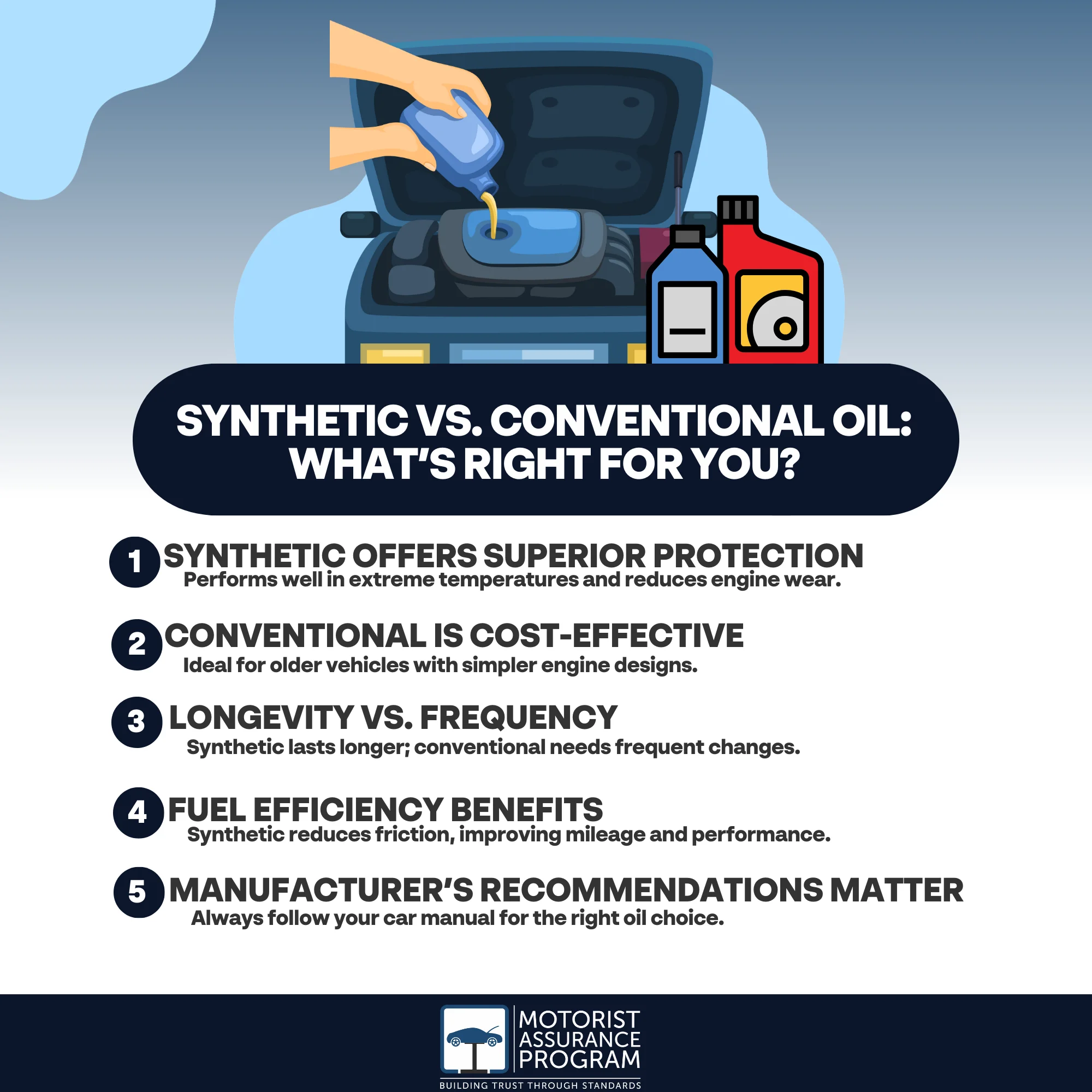Choosing between synthetic and conventional oil can greatly impact your car’s performance and longevity. Synthetic oil, engineered for superior lubrication, fights wear better and resists breakdown, making it ideal for extreme temperatures and high-performance engines. While it costs more upfront, its long-lasting nature means fewer oil changes and often improved fuel economy. Conventional oil may suffice for older vehicles and simpler engines but tends to require more frequent changes. Always check your manufacturer’s recommendations to make an informed choice that aligns with your driving habits and vehicle age. Explore more to see how each option fits your needs.

Key Takeaways
- Synthetic oil provides superior protection and performance, especially in extreme temperatures, compared to conventional oil.
- For newer or high-performance vehicles, synthetic oil is often recommended for optimal engine efficiency and longevity.
- While synthetic oil is more expensive upfront, its longer lifespan and reduced maintenance can result in overall cost savings.
- Conventional oil may be sufficient for older vehicles with simpler engine designs, depending on manufacturer recommendations.
- Always consult your car’s owner manual for specific oil type recommendations to ensure engine health and performance.
Understand the Differences in Composition
When you plunge into the world of engine oils, understanding the differences in composition between synthetic and conventional oil can considerably impact your vehicle’s performance. Synthetic oil is engineered from chemically modified petroleum components, providing a more uniform molecular structure. This results in better lubrication properties, reduced friction, and improved performance under extreme temperature conditions. On the other hand, conventional oil is derived from crude oil and contains more impurities, which can lead to more frequent breakdown and sludge formation.
The main difference between synthetic and conventional oil lies in their additive packages and base oils. Synthetic oils often incorporate advanced additives that enhance oxidation resistance, thermal stability, and overall longevity. This means they can last longer between changes and maintain performance in high-stress environments. Conventional oils, while effective for many vehicles, typically require more frequent changes due to their shorter lifespan and sensitivity to heat.
Ultimately, knowing the difference between synthetic and conventional oil helps you make informed choices. By selecting the right type for your vehicle, you can optimize performance and extend engine life, ensuring your car runs smoothly for years to come.
Compare Performance and Longevity
Choosing the right engine oil plays a significant role in your vehicle’s performance and longevity. When you compare synthetic oil vs conventional oil, you’ll notice distinct differences that can impact your driving experience. Synthetic oil is engineered to provide superior performance, particularly in extreme temperatures. It maintains its viscosity better than conventional oil, ensuring maximum engine protection during both hot summers and cold winters.
Additionally, synthetic oil offers enhanced lubrication properties, reducing friction between engine components. This means your engine runs smoother and experiences less wear over time. Regarding longevity, synthetic oil tends to last longer, requiring fewer oil changes compared to conventional oil. This can be a significant advantage for those who want to minimize maintenance efforts.
Evaluate Cost vs. Benefits
Evaluating the cost versus benefits of synthetic and conventional oil is essential for making an informed decision about your vehicle’s maintenance. When comparing synthetic vs. conventional oil, you should first consider the price difference. Synthetic oil typically costs more upfront, but it often offers superior performance, longevity, and protection for your engine.
While conventional oil might appear more budget-friendly, it necessitates more frequent changes, potentially leading to higher long-term costs. Additionally, synthetic oil withstands extreme temperatures and resists breaking down, which can enhance your engine’s efficiency and lifespan.
You should also think about the benefits of improved fuel economy that synthetic oil can provide. By reducing friction, synthetic oils can help your engine work more efficiently, which translates to savings at the pump.
In the end, while the initial investment in synthetic oil might be higher, the long-term benefits—such as reduced maintenance costs and prolonged engine life—often outweigh the extra expense. Ultimately, weighing the cost vs. benefits will guide you in choosing the right oil for your vehicle, ensuring peak performance and reliability.
Consider Your Vehicle’s Age and Usage
Understanding your vehicle’s age and usage is essential when deciding between synthetic and conventional oil. If you have an older car, conventional oil might suffice, as it’s often more cost-effective and aligns well with the simpler engine designs of past models. However, if you’re driving a newer vehicle or one that requires high performance, synthetic oil could be the better choice, offering superior protection and efficiency.
Here are some factors to take into account:
- Age of your vehicle: Older engines may benefit from conventional oil, while newer ones often thrive on synthetic.
- Driving habits: If you frequently drive in extreme conditions (like heavy traffic or harsh weather), synthetic oil can provide better performance.
- Mileage: Higher mileage engines might experience less wear with synthetic oil, especially if they’re prone to leaks.
- Manufacturer recommendations: Always check your owner’s manual for specific guidance.
Follow Manufacturer Recommendations
Manufacturer recommendations serve as an important guide when deciding between synthetic and conventional oil for your vehicle. Your car’s manual outlines the specific oil type that best suits its engine, helping you determine whether full synthetic vs. conventional oil is right for you. Following these guidelines guarantees peak performance and longevity.
When it comes to which is better, synthetic or conventional oil, the manufacturer’s advice is vital. If your manual specifies synthetic oil, using it can enhance fuel efficiency, reduce engine wear, and provide better protection under extreme conditions. Conversely, if conventional oil is recommended, it’s typically due to your vehicle’s design and age, which may not require the advanced properties of synthetic oil.
Ignoring these recommendations can lead to costly repairs and decreased engine performance. Always consult your owner’s manual and adhere to the specified oil change intervals. This not only maintains your vehicle’s health but also helps you make informed decisions about oil types, making sure you’re using the best option for your unique driving habits and vehicle needs. Trust in your manufacturer’s guidance; it’s your roadmap to keeping your engine running smoothly.
Frequently Asked Questions
Can I Switch From Conventional to Synthetic Oil Easily?
Switching from conventional to synthetic oil is generally straightforward. You can do it at your next oil change without issues. Just verify your engine’s compatible, and always consult your owner’s manual for specific recommendations.
How Often Should I Change My Oil Regardless of Type?
Changing your oil every 5,000 miles keeps your engine running smoothly. For instance, if you regularly drive in stop-and-go traffic, sticking to this schedule helps prevent sludge buildup and maintains peak performance.
Does Synthetic Oil Improve Fuel Efficiency?
Yes, synthetic oil can improve fuel efficiency. Its advanced formulation reduces engine friction, allowing your vehicle to run more smoothly. As a result, you might notice better mileage and overall performance from your engine.
Are There Environmental Benefits to Using Synthetic Oil?
Using synthetic oil can reduce harmful emissions, as it generally burns cleaner than conventional oil. It also lasts longer, leading to fewer oil changes, which means less waste and a smaller environmental footprint for your vehicle.
What Happens if I Mix Synthetic and Conventional Oil?
Mixing synthetic and conventional oil will water down the advantages of synthetic oil. Although it won’t lead to immediate harm, it may decrease performance and protection, making it advisable to use only one type.
Conclusion
In choosing between synthetic and conventional oil, think of your engine as a finely tuned instrument. Just as a musician selects the right strings for peak sound, you should pick the oil that harmonizes with your vehicle’s needs. If you drive in extreme conditions or prioritize performance, synthetic oil could be your best bet. However, for older cars or everyday driving, conventional oil might suffice. Ultimately, aligning your choice with your vehicle’s specifications will guarantee it plays a long, smooth tune.


